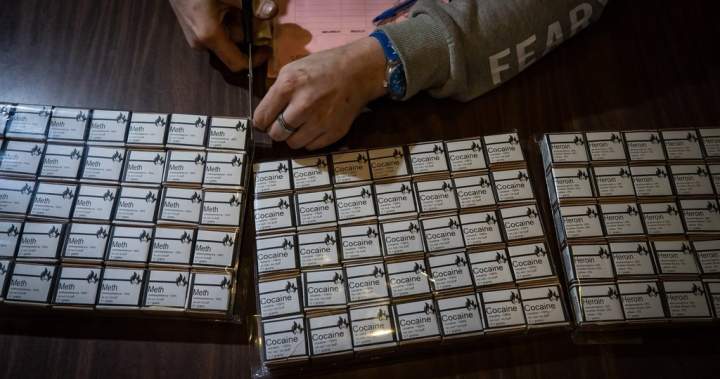A constitutional challenge by founders of a Vancouver “compassion club” who were found guilty of drug trafficking is expected to begin today at the British Columbia Supreme Court.
Jeremy Kalicum and Eris Nyx were found guilty by a B.C. Supreme Court judge earlier this month in relation to charges of possessing cocaine, heroin and methamphetamine for the purposes of trafficking.
That decision says the “the conviction will be held in abeyance pending the Constitutional challenge.”
A post to DULF’s website, dated March 3, 2025, says its legal challenge is seeking to prove that a section of the Controlled Drugs and Substances Act that prohibits possession of drugs for the purpose of trafficking is unconstitutional and “its enforcement is killing the very people it purports to protect.”
It says criminalizing alternatives to the unregulated supply of drugs forces users to rely on deadly street drugs that “disproportionately endangers lives.”
The post says they also intend to argue that the law perpetuates discrimination against people with disabilities, including those with substance-use disorders.

Get daily National news
Get the day’s top news, political, economic, and current affairs headlines, delivered to your inbox once a day.
DULF had operated the “compassion club” between August 2022 and October 2023.
In 2021, it approached Health Canada asking for permission to buy heroin, cocaine and methamphetamine on the dark web before having the drugs tested for contaminants and selling them to users through its “compassion club and fulfilment centre.”
Health Canada rejected the application for exemption from drug laws, saying DULF’s plan presented too many public health and safety risks. The group, however, went ahead with it anyway, saying it would save lives.
The unsanctioned operation triggered political criticism, particularly after it emerged that it had initially received $200,000 of public funding from the B.C. government.
The operation was shut down on Oct. 26, 2023, when officers conducted a raid and arrested Kalicum and Nyx, who were later charged with trafficking offences.
In her decision on Nov. 7, Justice Catherine Murray says the issue at trial was whether drug law exemptions granted to DULF allowed them to possess the drugs with the intent to sell them.
In the decision, Murray acknowledges that DULF was founded in response to the toxic drug crisis with the goal of distributing safe drugs and curbing overdose deaths.
The decision says the exemption authorized Kalicum and Nyx to test the drugs, package and label them, and provide supervised consumption of those substances, but it did not extend to selling the tested drugs to members.
The latest statistics from the BC Coroners Service shows 158 people in B.C. died from illicit drug overdoses in September, which equates to about 5.3 deaths per day.
Read the full article here

